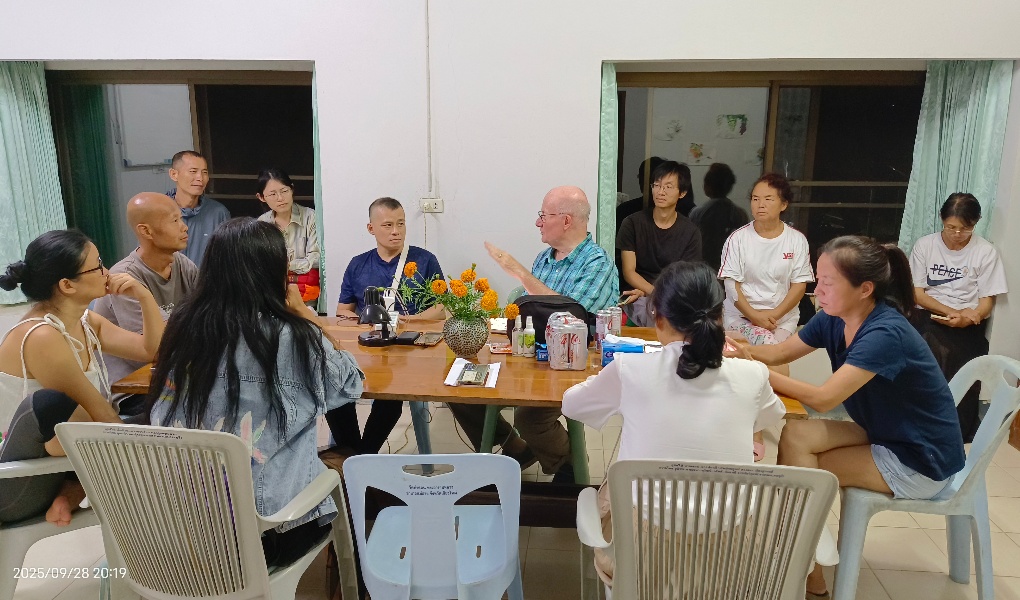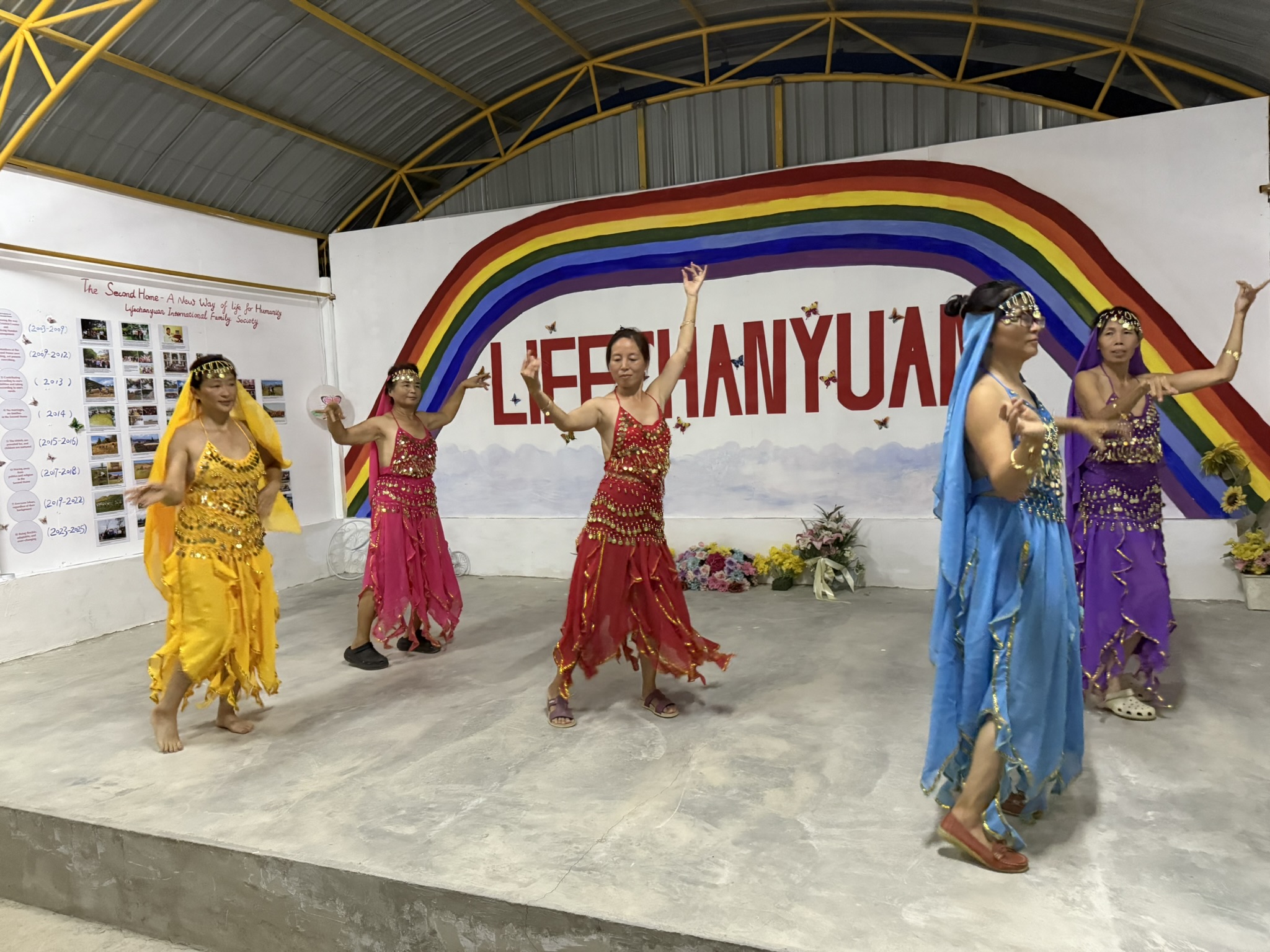|
Inside Lifechanyuan. 4. Xuefeng Communism in Practice: Daily Life in the Second Home
10/16/2025 Massimo Introvigne
The abolition of private property and a radical criticism of the family are rooted more in the idea of the spiritual community as a living entity than Marxism.
by Massimo Introvigne
Members at work in Yinyi Ecovillage.
Like many observers, when my study of Lifechanyuan started, I was struck by its founder’s use of the term “Xuefeng Communism.” Guide Xuefeng was once a member of the Chinese Communist Party. He occasionally quotes Marx and Mao, and his writings reference utopian socialism and revolutionary ideals. The Chinese police, in their crackdown, seemed to interpret the movement as a quasi-political commune. Even the New York Times journalist who visited Lifechanyuan in 2014, when it was still tolerated in China, emphasized its Communist echoes.
But after visiting the Thai Second Home in September 2025, I realized how misleading that framing can be. None of the Celestials I met had been CCP members. Only one—a former Taoist monk—expressed fascination with the Mao era. The rest were spiritual seekers who had journeyed through Christianity, New Age teachings, and even Falun Gong. One had read Rhonda Byrne’s classic self-help book “The Secret” and the writings of Taiwan’s New Ager Tiffany Chang (張德芬). Another was concerned about the “Maya” prophecy of 2012. Guide Xuefeng himself had a passage through the Jehovah’s Witnesses.
Xuefeng’s list of references is long. “The creation of the Communist community—the Second Home—draws inspiration from the teachings of Jesus Christ, Buddha Sakyamuni, the Immortal Laozi, Prophet Muhammad, and sages of past generations. It originates from the descriptions of the Greek philosopher Plato and the Chinese sage Confucius; from the thoughts of Marx, Engels, Lenin, Mao Zedong, the founders and pioneers of communist theory; from the ideals of utopian socialists and practitioners such as Owen, Saint-Simon, and Fourier; from the wishes of diligent, kind-hearted, simple, sincere, and trustworthy ordinary people; and from more than two millennia years of human experiments in thousands of utopian communities.”
What I encountered in Thailand was not a political commune, but a spiritual experiment—radical, joyful, and deeply intentional. “Xuefeng Communism” is not Marxism with incense. It is a new model of living, rooted in metaphysics, ethics, and a vision of humanity’s future.
However, the Second Home is indeed defined by the lack of private property. Members do not own their clothes, phones, or furniture. All belongings are shared. Each community has a member responsible for financial matters. If someone needs a shirt, a notebook, or a bus ticket, they ask the member in charge of procurement, who will buy it for them. For more expensive items, members must consult the branch director or, in cases like flight tickets, Guide Xuefeng himself. The branch director oversees the branch’s overall operations. However, he is not considered a “leader.” He acts as a facilitator.

Discussing the community’s structure with members of the Thai Second Home.
“Members of the Communist community—the Second Home—possess nothing personally,” proclaims Xuefeng. “No individual owns private property or money. Everything belongs to the community, not to any individual. Each person may freely enjoy everything in the community according to their needs, provided there is no extravagance or waste.”
This ethos is not enforced through rules or surveillance. It is lived. Members told me they feel liberated by it. “I used to worry about bills, rent, and savings,” one Celestial said. “Now I just live.”
Everyone works. There are no bosses, offices, or titles. Tasks are chosen based on interest and skill. One member tends the garden, another cooks, and a third manages the website. The community’s core text, “800 Values for New Era Humanity,” states that “there is no place for lazybones or parasites.”
The Marxist principle, “Contributing according to ability, receiving according to need,” is proudly proclaimed but reinterpreted. “Every person’s abilities and physical strength differ. In the community, as long as each member contributes their best effort daily within their own capacity, it is enough. No one is forced to do what they cannot. Whatever an individual needs is fully provided, so there is no issue of distribution.” Guide Xuefeng calls this “Hundunic Management”—a form of “non-management” where everything flows naturally. “Hundun” (浑沌) is a term indicating the primordial chaos, but is used by Xuefeng to allude to the holographic nature of the universe. He insists that ultimately “Hundun is not chaos—it is order. Hundun is governed by meticulous rules, leaving no room for loopholes.”
“Hundunic Management means ‘non-management,’ for the highest level of management is no management at all—letting everything follow natural principles, with completely humanized administration. Therefore, in the community, there are no leaders, no offices, no managers. Everyone is a manager; everyone is the master of the community. There are no superiors and subordinates, no social classes—everyone is equal.”
In practice, hierarchy is minimal. A woman in the Thai Second Home has been with Lifechanyuan almost since its beginning. Members told me she is expected to be the next spiritual guide when Xuefeng dies. I saw people ask her for clarification on complex principles. But she does not lead in any conventional sense. Her authority is quiet, relational, and earned.
The veteran Celestial expected to be the next spiritual guide after Xuefeng dies.
The community’s structure reminded me of anarchist ideals from the 19th and early 20th centuries—horizontal, cooperative, and fluid. However, unlike anarchist experiments, Lifechanyuan is not driven by resistance. It is driven by joy.
The most radical aspect of Lifechanyuan is its rejection of the nuclear family. Members do not marry. The “800 Values” describe families as “the root cause of suffering and afflictions.” “Marriage and family,” insists Xuefeng, “are the breeding ground of selfishness, the source of worries and pain, and the root cause of endless exploitation and waste of natural resources. Therefore, in the Communist community—the Second Home—there is no marriage and no family.”
The rejection is uncompromising, as we read in the “800 Values”: “Wherever families exist, so will endless misery and suffering; if we do not deal with the root cause, then the misery and suffering will remain and never end. Buddha, Jesus Christ, and Bodhisattva Guan Yin could not help even if they were still in the mortal world; were families to exist in heaven, even heaven would become an abyss of misery.”
This is not a rejection of love or sexuality. “Fully enjoying emotional love and sex love accords the will of the Greatest Creator and is a part of beautiful life that cannot be ignored and expropriated.” “As long as both parties are attracted to each other, they can do whatever they feel is appropriate; nobody supervises, interferes, bothers, gossips, or backsides; lovers never possess, occupy, or are jealous of each other.” “There is no family, marriage, or husband-wife relationship in the Second Home. Once inside the Second Home, everyone is free and is free from any bondage and shackles in the matter of emotional love and sex love. On the basis of mutual consent and within the code of civility, one will not be subject to any form of restraint and supervision in his or her emotional life and sex life. Anyone who attempts to limit and supervise others’ freedom of emotional love and sex love has deviated from the values of Chanyuan and will not be entitled to live in the Second Home.”
However, Celestials are taught that, if they become excessively attached to them, affection and love that “exceed the proper amount” may become “the poison of life.” They try “not to engage in one-to-one romantic relationships,” as they may destroy the communal ethos.
They are not opposed to childbirth. However, the idea is that children should be educated by the community, not by individual parents. Ideally, they should not even know who their biological parents are (but this is not the case with the only child living in the Thai Second Home, who was not born there; his parents joined when he was four). “The elderly are cared for by the community, and children are raised and educated by the community. Children no longer worry about parents, and parents no longer worry about children.”
Lifechanyuan is not ascetic. It is celebratory. Members sing and dance. They create art—not for prestige or profit, but as an offering to the Greatest Creator. One Celestial told me, “Creating beauty makes the Creator happy. And it makes us happy too.”

Dances and music in the Thai Second Home.
There are no religious icons, rituals, holidays, altars, incense, or sermons. Spiritual experiences are personal. Nature is the only temple.
“The Communist community—the Second Home—does not engage in any political activities, nor religious rituals,” explains Xuefeng. “All activities follow the principles of nature. There is no idol worship, no political or religious holidays or ceremonies. Instead, members love the mountains, rivers, grasses, and trees, and protect insects, birds, animals, and all of nature.”
This reverence is woven into daily life. Waste is minimized. The community feels like a living organism—sensitive, responsive, and alive.
Lifechanyuan rotates tasks, changes residences, and reshuffles social dynamics to prevent stagnation. “To enrich cultural life and inner development, to encourage love of life, love of living, and love of existence, residences are frequently changed, work shifts according to need, personnel rotate, and recreational and game activities are constantly renewed.” “Two people cannot remain together long-term; everyone is always in a fresh environment.” The principle—called “Flexibility and Harmony”—is designed to keep entropy low and creativity high. It avoids cliques, factions, and “feudal divisions” (a term that, curiously, Lifechanyuan borrows from official CCP language). It ensures that the community remains dynamic.
A Celestial playing the ocarina (with considerable skill).
Members told me that this constant change can be challenging. “Sometimes, I want to stay in one place,” one woman said. “But then I remember—life is movement. And movement is freedom.”
Guide Xuefeng sees Second Home as more than a community. He sees it as a prototype for humanity’s future. “We have already paved a sunlit path for humanity. In the Communist community—the Second Home—people basically live happily, joyfully, freely, and blissfully.”
It is a bold claim, but after spending time in the Thai Second Home, I understand its appeal. Lifechanyuan offers a vision of life beyond ownership, hierarchy, and isolation. It is not perfect and not for everyone, but it is sincere, coherent, and lived.
Link: https://bitterwinter.org/inside- ... in-the-second-home/
中文翻译:
走进生命禅院·第四篇:雪峰共产主义的实践——第二家园的日常光影
2025年10月16日 马西莫·英特罗维涅
对私有财产的放下,对家庭的激进反思,更出自把精神共同体视为鲜活生命的理念,而非马克思主义的理论。
像许多观察者一样,当我初次踏入生命禅院的世界时,我为创始人提出的“雪峰式共产主义”这一理念所震撼。雪峰导游曾为中国共产党的一员,他偶尔引用马克思与毛泽东,著作中亦闪现乌托邦社会主义和革命理想的光芒。中国警方在打击中,将这一运动视作准政治公社;即便是2014年曾访问生命禅院的《纽约时报》记者——那时生命禅院在中国仍被容忍——也难掩其中共产主义的回响。
然而,2025年9月,当我踏入生命禅院第二家园——泰国分院时,我才意识到先前的框架或许会误导人。与我相遇的禅院草中,没有一人曾是中共党员。只有一位——曾为道士——对毛时代抱有一丝兴趣。其余的人皆为精神的追寻者,曾涉足基督教、新时代教义,甚至法/轮/功。其中一位研读过朗达·拜恩的心灵成长书《秘密》,以及台湾新时代学者张德芬的著作;另一位对2012年的玛雅预言怀抱兴趣。雪峰导游本人,也曾在生命旅途中接触过耶和华见证人的教义。
雪峰的参考书目浩如星海。“雪峰式共产主义——第二家园——的建立,汲取了耶稣基督、释迦牟尼佛、仙人老子、先知穆罕默德及历代圣贤的教诲;它源自希腊哲学家柏拉图与中国圣贤孔子的思想光辉;汲取了马克思、恩格斯、列宁、毛泽东及共产主义理论奠基者和先驱的理念;承载了乌托邦社会主义者如欧文、圣西门、傅立叶的理想愿景;源自勤劳、善良、朴实、真诚且值得信赖的普通人的心愿;更植根于两千余年间,人类在成千上万个乌托邦社区中进行的探索与实验。”
我在泰国所见的,并非一个政治公社,而是一场精神的实验——激进、充满欢愉,带着深意与目的。“雪峰式共产主义”并非披着香火的马克思主义,它是一种全新的生活模式,扎根于形而上学与伦理之中,也孕育着对人类未来的美好愿景。
然而,第二家园的核心在于消解私有财产。成员不拥有自己的衣物、手机或家具,所有物品皆为共享。每个社区都有一位财务负责人,掌管账目和支出;若有人需要一件衬衫、一支笔记本或一张公交票,则向负责采购的成员提出申请,由其代为购买。对于更贵重的物品,成员需咨询分院院长,或在机票等特殊情况下,请示雪峰导游本人。分院院长统筹整体运作,但他并非传统意义上的“领导者”,而更像一位园丁,仅负责协调,使社区运转自然而和谐。
“雪峰式共产主义——第二家园——的成员,个人一无所有,”雪峰宣称。“没有人拥有私有财产或金钱,一切归属于第二家园,而非任何个人。只要不铺张浪费,每个人都可按需自由享用这里的一切。”
这种理念并非依靠规章制度或监控来强制执行,而是在生活的每一刻自然流淌、得以体现。成员们告诉我,他们因此感到真正的解放。“我曾为账单、房租和存款而忧心忡忡,”一位禅院草说道,“如今,我只管活在当下。”
每个人都在劳动,生活本身便是工作的舞台。这里没有老板、办公室或头衔,任务由兴趣与能力自由选择。一位成员打理花园,另一位在厨房烹饪,还有人管理网站。《新时代人类八百理念》,第二家园的核心信条,昭示道:“坚决杜绝懒惰者的存在,第二家园绝不允许有寄生虫存在。”
马克思主义的原则“按能力贡献,按需分配”在这里被自豪地传行,却也获得了新的诠释。“每个人的能力与体力各不相同,在社区里,只要每位成员在自身所能范围内每日尽心尽力,便已足够。无人被迫完成超出自身能力的事,每个人的所需都能得到充分满足,因此根本不存在分配的困扰。”雪峰导游称这种方式为“浑沌式管理”——一种“不管理”的智慧,让一切顺其自然地流动。“浑沌”原指天地初开的混沌状态,但在雪峰眼中,它暗示着宇宙的全息本质。他坚信:“浑沌非混乱——它是一种秩序,一种精密规则掌控的秩序,无一漏洞可乘。”
“浑沌式管理意味着‘无为而治’,因为管理的最高境界,正是无需管理——让万物顺应自然法则,同时实现人性至上的治理。在第二家园里,没有领导者,没有办公室,也没有管理者。每个人都是自己的主人,也是第二家园的守护者。不存在上下级,亦无社会阶层——人人平等,共享自由。”
在实践中,等级体系几乎不存在。在生命禅院第二家园泰国分院,有一位女性几乎从第二家园创立之初便融入了社区。成员们告诉我,当雪峰导游离世时,她有望成为下一任精神引导者。我看到人们会向她请教那些复杂而深奥的原则问题。然而,她并不以任何传统意义上的权威领导社区。她的影响力安静而自然,建立在关系之上,并且完全靠自身赢得。
第二家园的结构让我联想到19世纪和20世纪初的无政府主义理想——平等、合作、自由流动。然而,与那些由反抗精神驱动的实验不同,生命禅院的动力并非反叛,而是源自纯粹的快乐与喜悦。
生命禅院最为激进之处,莫过于对核心家庭的否定。成员不结婚。《新时代人类八百理念》将家庭视为“痛苦与烦恼的根源”。雪峰坚持说道:“婚姻与家庭,是自私的温床,是焦虑与痛苦的源泉,也是无尽剥削与自然资源浪费的根源。因此,在雪峰式共产主义——第二家园——中,不存在婚姻,也不再有家庭。”
这种否定态度毫不妥协,《新时代人类八百理念》中写道:“哪里有家庭的存在,哪里就有无穷无尽的悲苦产生。如果不从根上下手,即使佛陀基督观世音菩萨在世,也无济于事。如果天堂里有家庭存在,天堂也会变成苦海的。”
这并非对爱情或性的否定。正如生命禅院理念所言:“充分享受情爱性爱,符合佛祖上帝的意愿,是美好生活中不可或缺的一部分。”“只要两情相悦,爱怎么做,就怎么做,没人监督,没人干涉,没人过问,没人背后说闲话。相互不拥有、不霸占、不忌妒。”“第二家园没有家庭,没有婚姻,没有夫妻关系,一旦进驻第二家园,人都是自由的,情爱性爱上不再有任何束缚和桎梏,只要两厢情愿又坚守文明法则,其情爱性爱活动不受任何形式的制约和监督,任何人,一旦试图去限制和监督他人的情爱和性爱自由,就是背离了禅院理念,就没有资格生活在第二家园。”
然而,禅院草们被教导,如果对情爱过度依恋,超过“适当限度”的爱,可能化作“生命的毒药”。因此,他们尽力避免一对一的恋爱关系,以维护社区整体的和谐氛围。
他们并不反对生育,但他们的理念是,孩子应由社区共同教育,而非依赖个人父母。理想中,孩子甚至无需知道自己的生物父母身份(但在泰国第二家园中,唯一的孩子并非出生于此——他的父母在他四岁时加入社区)。“老人由第二家园照料,孩子由第二家园抚养与教育。孩子不再为父母忧心,父母也不再为孩子挂念。”
生命禅院并非苦行之地,而是生命的庆典之所。成员们歌唱起舞,创作艺术——不是为了名利与虚荣,而是作为对佛祖上帝的虔诚奉献。一位禅院草告诉我:“创造美,使佛祖上帝欢喜,也让我们的心灵同样欢愉。”
这里没有宗教偶像、仪式、节庆、祭坛、香火,也没有布道。精神体验完全属于个人,而大自然便是唯一的圣殿。
“雪峰式共产主义——第二家园——不参与任何政治事务,也不举行宗教仪式,”雪峰解释道。“所有活动皆遵循自然法则。无偶像崇拜,无政治或宗教的节日与典礼。相反,成员们热爱山川河流、草木花卉,守护昆虫、鸟类、兽类,以及一切生灵与自然。”
这种敬畏之心融入了日常生活。浪费被降至最低,社区宛如一个鲜活的有机体——敏锐、灵动,充满生命的律动。
生命禅院通过轮换工作任务、变换住所、重组社交关系,防止生活与心灵陷入僵化。“为了丰富文化生活与内在成长,激发对生命、生活与存在的热爱,住所常常更换,工作任务灵活轮换,人员轮流调动,娱乐与游戏活动不断焕新。”“两个人无法长期停留在同一环境;每个人总在新境遇里体验生活。”这一理念被称为“灵活与和谐”,旨在保持低熵、激发高创造力。它避免形成小集团、派系或“封建划分”(颇为奇特的是,生命禅院巧妙借用了官方中共语言的这一术语),确保社区始终充满生机与流动。
成员们告诉我,这种不断变化有时颇具挑战。“有时,我只想停留在一个地方,”一位女性说道,“但随后我会想——生命本就是流动,而流动即是自由。”
雪峰导游视第二家园不仅仅为一个社区,而是一种人类未来的原型。“我们已为人类铺就一条阳光大道。在雪峰式共产主义——第二家园——人们基本上能够开心、快乐、自由、幸福地生活。”
这是一个大胆的宣言,但在生命禅院第二家园泰国分院度过一段时光后,我终于理解了它的魅力。生命禅院展现了一种超越私有、等级与孤立的生活愿景。它并不完美,也未必适合每个人,但它真诚而一致,如同一条可行的道路,指向自由与心灵的安宁。
|